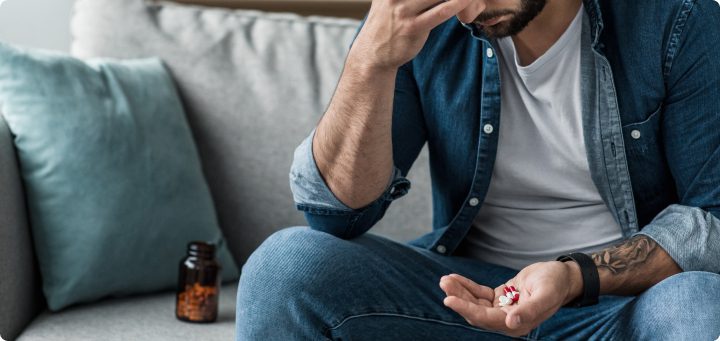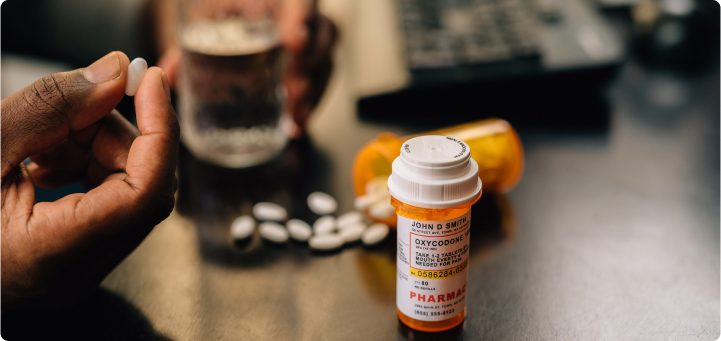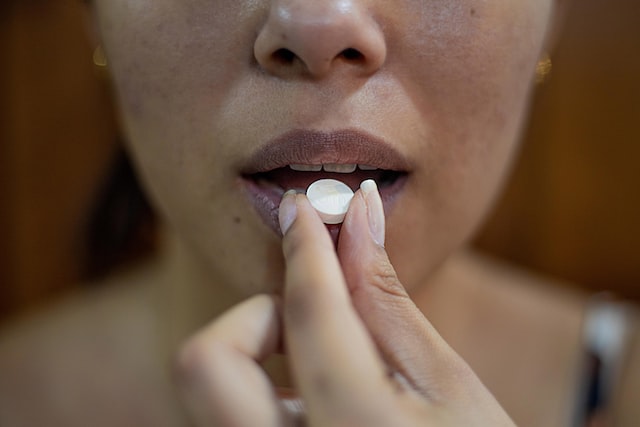Opioids are a powerful class of drugs obtained from the opium plant. They are prescribed for persistent or severe pain relief. Drugs in this class are highly potent and are used by people experiencing cancer-related or post-surgical pain. Prescription opioids also treat chronic aches and pain from accident-related injuries. Opioids are effective painkillers, but they are highly addictive due to the euphoric or calming effect they bring. Unregulated opioid use will lead to psychological or physical dependence, as well as adverse health effects.
Examples of opioid drugs include morphine, codeine, fentanyl, oxycodone, hydromorphone, and illegal substances like heroin. Other opioids like methadone and buprenorphine are used as substitute drugs in opioid addiction treatment.
Canada is currently grappling with an opioid addiction crisis. A total of 7,328 apparent opioid toxicity deaths occurred between January and December 2022, an average of 20 deaths daily. According to the Centre for Addiction and Mental Health, opioid overdoses now account for more deaths than automobile accidents in Canada. It’s crucial to seek help immediately if you or someone you know is struggling with opioid addiction. CCFA offers an opioid addiction treatment and rehab program in Ontario.

Getting Help for Opioid Addiction
If you or a loved one is dealing with opioid abuse or addiction, the Canadian Centre for Addiction can help. At CCFA, we offer the most sophisticated opioid addiction treatments in an environment that inspires lasting change. We also help people understand their addictions and the healthier coping strategies available to them by engaging them in one-on-one counselling with certified counsellors, psychiatrists, and mental health professionals. Call 1-855-499-9446 to learn more about our opioid treatment program.
How We Treat Opioid Addiction and What to Expect
At CCFA, we understand that the best treatment for opioid addiction is one designed to meet the individual’s specific needs. We tailor our treatment strategies to meet the unique symptoms of the client. Our visitors can expect a full range of quality services that provide flexible therapy and counselling for addiction. We also know that addiction can negatively impact every aspect of your life, so our specialists will assess you to provide an individualized, client-centred approach to treatment.
Our opioid treatment centre offers inpatient rehab, outpatient treatment, individual and group counselling, intervention counselling, and lifetime aftercare, all designed to give you the best chance at recovery.
When to Seek Help for Opioid Addiction
Most people who become addicted to opioids start with a prescription. So, it may be challenging to detect when a person is involved in opioid abuse. Like all medications, opioids have side effects that may manifest even when the individual is not misusing or addicted to the drug. However, there are indicators that a person’s opioid use has become a problem. The presence of one or more of these signs suggests that one needs to seek help immediately:
- Using the drug in greater doses than prescribed
- Trying and failing to stop using the opioid drug
- Having intense cravings for the drug
- Spending a great deal of time getting, using, and recovering from the effects of the drug
- Decreased productivity at work or school due to opioid use
- Continued use of the drug despite negative consequences on one’s health, finances, or relationships
- Needing increased amounts of the drug to get the same effects – tolerance
- Becoming drug-dependent; unable to go about your daily activities without the drug
Why Should You Choose the Canadian Centre for Addictions?

Opioid addiction is a disease that requires professional care to overcome successfully. The stigma associated with addiction also makes it challenging to speak up or determine the right place to seek help. Addiction also disrupts your life and disconnects you from the things that matter. At CCFA, we offer a patient-centric approach that keeps you connected to your life and responsibilities outside so your transition to regular life is as smooth as possible.
We take our work seriously because we understand that our clients are at a vulnerable point in their life. We are open, honest, and communicative about what we deliver and take the first step towards building the trust needed to form strong bonds with those who need our help.
We also understand that addiction affects not only the individual but others close to them. So, our therapists and staff extend their care to helping families cope with addiction while treating their loved ones. We not only help people overcome their addictions, but we also help them navigate the hurdles that addiction creates for those who care about them.
Treatment at CCFA doesn’t end but evolves when you leave. We offer a place where people can return to if things get hard. Our combination of quality inpatient care and the sense of community from our aftercare services provide a balance you can rely on year after year.
The Canadian Centre for Addictions Success Stories
At CCFA, we have recorded tremendous success in treating people addicted to opioids and other substances. Here are testimonials from some of our satisfied clients:
“The highly competent staff is able to provide emotional and physical support as well as effective addiction therapy. With an open mind, I found I was able to draw healing from each of the well-balanced and skillfully presented meetings and activities. During my stay at CCFA, I learned how to regain control of my life. I left with skills I require to keep moving forward in my recovery. The facility is spacious, comfortable and clean, and the community is exceptional. The fitness and activities, as well as the delicious meals, are outstanding. By far, this was the most productive 30 days of my life. A gift from me to me!”
Elliot Hester
“I came in with a broken soul, full of self-pity, not liking who I was, full of fear and low self-esteem. During my stay, I learned so many valuable lifelong lessons. The counsellors challenged me to feel again; to think and understand those feelings, to express my feelings and thoughts. They have taught me the strategies and tools that I must apply to my new life going forward. For the first time in my life, I feel calm, relaxed, strong with the new me, and most importantly, HAPPY. Thank You.”
Edmund Rudd
“My involvement with CCFA has been an absolute lifesaver for me. The entire program and one-on-one sessions have given me the look and strategies to leave with and have a clean and sober life going forward. A very warm, welcoming, home-like environment.”
Martha Esquivel
“The CCFA has showed me a new way of life. The counsellors here are amazing, love working with all of them. I had a great stay and can’t wait to continue my road to recovery with the tools I have learned. Thank you.”
Kiaan Ochoa
Types of Treatment for Opioid Addiction

At CCFA, we offer multiple treatment options for opioid addiction. Our opioid treatment programs are designed to address the client’s specific needs and include the following:
Detox
Detox is the process of getting every trace of an addictive substance out of the client’s system. Opioid withdrawal symptoms are extremely unpleasant and potentially dangerous. Our detox program allows you to rid your body of the drug in a safe, controlled environment under professional supervision.
Inpatient Rehab
Severe cases of opioid addiction may require residential treatment. Inpatient rehab is an intensive treatment for severe cases of opioid addiction. CCFA provides a sober and secure environment for clients to recover from their addiction. Our opioid treatment centres utilize patient-oriented protocols to set our clients on the path to recovery. We employ a holistic approach by combining medical treatment with other relevant treatment options.
Outpatient Treatment
In outpatient treatment, the individual lives at home but attends scheduled appointments and meetings. Outpatient treatment is ideal for clients with manageable symptoms and sufficient motivation to get better. It often requires a reliable support network of friends and family to encourage and help the patient stay on the path to full recovery.
Counselling
Addiction is often caused by negative thinking patterns that fuel harmful behaviour. Finding and modifying the root cause of these thought patterns is often crucial to overcoming addiction. Our addiction counselling programs involve individual or group sessions that help participants identify and change these thought patterns and behaviors. It also helps spot and resolve past trauma that may be promoting addictive behavior. CCFA’s counselling and intervention programs help addicts develop positive attitudes and skills, which they’ll use as they begin their journey to sobriety.
Aftercare
Addiction recovery does not end with treatment. Recovering addicts require continuous aftercare services to prevent relapse when they face challenges. Our relapse prevention programs equip patients with the tools and coping mechanisms to remain sober when they inevitably encounter triggers. An aftercare treatment plan depends on an individual’s situation and may include outpatient treatment, counseling, and 12-step programs.
What to Expect in Opioid Addiction Treatment
When you come to CCFA for opioid addiction help, you can expect treatment in an environment that inspires lasting change. The first thing we’ll do when you come in for treatment is to evaluate and understand your situation so that we can design a specialized recovery plan. We will assess your medical history to determine whether you’re using other drugs besides opioids.
We will screen you for co-occurring mental health disorders and perform tests to determine the amount of opioids in your system. We will start your treatment with detox to rid your body of every trace of the drug. If your situation is severe, you will be admitted to our facility so our staff can safely monitor and manage your withdrawal symptoms. Otherwise, you’ll be allowed to go home and return for scheduled appointments.
We offer individual and group counselling sessions to help our clients identify and change thought patterns that may fuel substance use and addiction. Our holistic treatment programs incorporate activities like meditation, mindfulness, and yoga to help our clients stay grounded. You may also be encouraged to join a support group where you connect and interact with others at different stages of recovery.
Your treatment does not end when you leave our centre. At CCFA, we provide aftercare and relapse prevention services as part of our treatment program. We teach our clients to identify their triggers and design strategies to avoid or get through them. We also offer bi-weekly in-person aftercare visits and teleconferencing options to ensure long-term recovery.
Opioid Addiction Treatment Stages
The stages in the treatment of opioid addiction are:
- Detox
- Inpatient/Outpatient treatment
- Counseling/therapy
- Aftercare
Understanding Opioid Addiction

Opioid addiction is a disorder in which an individual cannot stop using opioid drugs despite obvious harmful physical or psychological health impacts. It is marked by a compulsive and irresistible urge to use the drug for non-medical reasons. Opioids are highly addictive because they trigger powerful reward centres in the brain. They flood the brain with endorphins, feel-good chemicals that diminish pain perception, produce pleasurable sensations, and leave the user with an overall feeling of well-being.
These feelings wear off when a dose has run its course, leaving the user craving them again. If they continue using opioids to feel good, they’ll quickly develop tolerance, needing increased doses for the same effect. Doctors usually refuse to increase a patient’s opioid dose or give them another prescription if they build tolerance. Users who believe they need to keep getting those euphoric feelings may turn to illegal sources for their fix. Illegally obtained opioids are often laced with contaminants or mixed with more potent drugs like heroin, fentanyl, or benzodiazepines. Using these drugs without medical supervision increases the risk of injury or overdose death.
Continued opioid abuse will lead to dependence – a situation where the individual cannot function normally without the drug – and full-blown addiction. They will also experience unpleasant withdrawal symptoms if they try to stop or reduce their opioid use.
Withdrawal Symptoms of Opioids
Opioid withdrawal symptoms occur when you stop taking opioids after your body has become dependent on them to feel good. They may be mild to severe, depending on the quantity and length of use. These symptoms last a few days to weeks. Opioid medications have similar withdrawal symptoms, including:
- Anxiety and depression
- Restlessness
- Goosebumps
- Body and muscle aches
- Sweating
- Nausea and vomiting
- Tremors
- Elevated blood pressure
- Fever
- Fast heartbeat
- Rapid breathing
- Seizures
- Dilated pupils
- Hallucinations
Opioid Addiction Symptoms

Symptoms of opioid addiction could be physical or behavioural.
Physical symptoms include:
- Headaches
- Diarrhoea
- Constipation
- Vomiting
- Track marks
- Injection sites
- Disorientation
- Inability to communicate
- Slurred speech
- Diminished impulse control
Behavioural symptoms of opioid addiction include:
- Social isolation
- Lack of coordination
- Anxiety
- Mood swings
- Lying
- Stealing
- Forging prescriptions
- Doctor shopping
- Depression
- Paranoia/detachment from reality
What are the Causes of Opioid Addiction?
There is no single cause of opioid addiction, and opioid medications are generally safe when used according to prescription. However, the risk factors can increase a person’s chances of losing control over their use and becoming addicted.
Family History and Genetics
Between 40% and 60% of a person’s risk of becoming addicted to opioids and other prescription medications may be linked to their genes. People from homes where a parent or relative has had a substance abuse problem may have a higher risk of developing opioid addiction.
Self-Medication
People who self-medicate or use opioids without a prescription for medical or non-medical reasons are likely to become dependent and addicted.
High Doses
People with severe or chronic pain who need high doses of opioid medication have a higher chance of misusing and becoming addicted to their prescriptions.
History of Substance Abuse
Individuals who abuse gateway drugs like cannabis or alcohol may turn to opioids if they develop tolerance or need a stronger fix. Continued use of opioids in this way can cause addiction.
Environmental and Social Pressure
Young people exposed to substance use have a higher chance of abusing and becoming addicted to opioids later in life.
Long-term Effects of Opioid Addiction
Opioid addiction can cause severe and life-threatening long-term effects such as:
- Liver damage
- Increased sensitivity to pain (hyperalgesia)
- Muscle rigidity
- Chronic constipation
- Delayed gastric emptying
- Cardiac arrhythmias
- Increased risk of fractures
- Rapid, involuntary muscle jerks (myoclonus)
- Potentially fatal withdrawal symptoms in babies born to mothers addicted to opioids
- Death from overdose
Additional Opioid Addiction Resources
Frequently Asked Questions
Opioids activate reward centres in the brain, releasing feel-good chemicals that leave you with a euphoric feeling and a sense of well-being. The need to keep experiencing these feelings makes addicts use the drug repeatedly.
Opioid use can change your personality as it takes priority over everything and becomes the central focus of your life. It may lower your inhibitions leading to impaired judgment, poor decision-making, and risky behaviour. Opioid users may also become more impulsive, extroverted, and socially disagreeable as they progress in their use.
Opioid addiction is very powerful as it can take over a person’s life and become the sole focus of their existence. It can also lead to severe health problems or death from overdose.
Addiction to opioids is rare when used for end-of-life care. Patients receiving palliative care are monitored closely, and their opioid doses are adjusted as required.
Yes. Opioids may increase depression risk, particularly when used without a prescription. This study showed that about 10% of people who use prescription opioids may develop depression at some point in their lives. Individuals who used opioids for a month or more had a higher chance of becoming depressed.
Opiate use for non-medical reasons is most common among adults aged 18 to 25, while prescription opioid use is most prevalent among adults aged 26 and older.
Yes, studies show that people dependent on opioids may have significantly shorter life expectancies.
The United States is the world’s biggest consumer of opioids, with the North American nation accounting for over 80% of the global opioid consumption.
Oxycodone (OxyContin) is the top-selling opioid drug. Other widely distributed opioids include hydrocodone (Vicodin), morphine, and methadone.
The safest painkiller to take is acetaminophen (Tylenol). It is effective for mild pain and does not cause side effects like bleeding or stomach pain.




